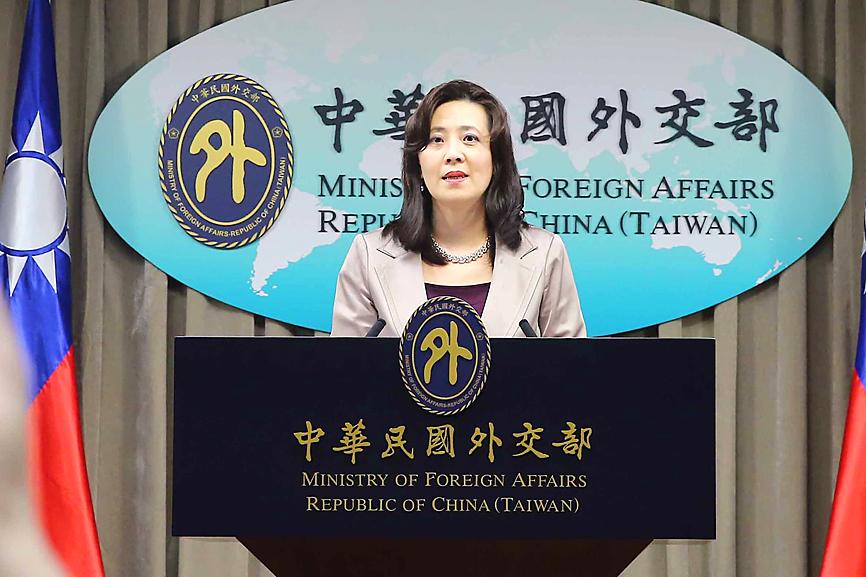Differences between the two sides of the Taiwan Strait should be resolved through constructive dialogue and interaction, rather than unilateral intimidation by one side, the Ministry of Foreign Affairs (MOFA) said yesterday in response to remarks by Chinese Minister of Foreign Affairs Wang Yi (王毅) about Taiwan.
Wang told a news conference in Beijing on Sunday that Taiwan was an indivisible part of China and that the two sides of the Strait would “certainly be reunified” one day.
He called on US President Joe Biden’s administration to recognize the sensitivity of the Taiwan issue, abide by Beijing’s “one China” principle and the Three Joint Communiques, and not follow the previous US administration’s “dangerous practices” of “crossing the red line” and “playing with fire.”

Photo: Yu Kai-hsiang, Taipei Times
Ministry spokeswoman Joanne Ou (歐江安) told a news briefing in Taipei that Taiwan has never been a part of China and that only its 23 million people have the right to decide on the nation’s future.
Beijing’s use of various means to marginalize Taiwan does not benefit cross-strait relations, but only increases the ill feelings of Taiwanese toward the Chinese government and garners more support for Taiwan from the international community, Ou said.
The two sides of the Strait share the responsibility of maintaining peace and stability, instead of one side unilaterally imposing its will on the other through intimidation, she said.

Photo: Reuters
Ou urged Beijing to face the reality of cross-strait relations, respect the opinions of Taiwanese and consider gestures of goodwill to improve bilateral relations.
Promoting constructive dialogue and interaction should be prioritized to protect the welfare of people across the Strait, gradually resolve bilateral divergence and open a new page of cross-strait peace, Ou said.
Ou also thanked Washington for continuing to support Taiwan, after White House spokeswoman Jen Psaki on Monday reaffirmed the US’ commitment to Taiwan.
“Our position on Taiwan remains clear: We will stand with friends and allies to advance our shared prosperity, security and values in the Indo-Pacific region. We maintain our longstanding commitments, as outlined in the Three Communiques, the Taiwan Relations Act and the ‘six assurances,’ and we will continue to assist Taiwan in maintaining a sufficient self-defense capability,” Psaki told a news briefing.

GAINING STEAM: The scheme initially failed to gather much attention, with only 188 cards issued in its first year, but gained popularity amid the COVID-19 pandemic Applications for the Employment Gold Card have increased in the past few years, with the card having been issued to a total of 13,191 people from 101 countries since its introduction in 2018, the National Development Council (NDC) said yesterday. Those who have received the card have included celebrities, such as former NBA star Dwight Howard and Australian-South Korean cheerleader Dahye Lee, the NDC said. The four-in-one Employment Gold Card combines a work permit, resident visa, Alien Resident Certificate (ARC) and re-entry permit. It was first introduced in February 2018 through the Act Governing Recruitment and Employment of Foreign Professionals (外國專業人才延攬及雇用法),

RESILIENCE: Deepening bilateral cooperation would extend the peace sustained over the 45 years since the Taiwan Relations Act, Greene said Taiwan-US relations are built on deep economic ties and shared values, American Institute in Taiwan (AIT) Director Raymond Greene said yesterday, adding that strengthening supply chain security in critical industries, enhancing societal resilience through cooperation and deepening partnerships are key to ensuring peace and stability for Taiwan in the years ahead. Greene made the remarks at the National Security Youth Forum, organized by National Taiwan University’s National Security and Strategy Studies Institution in Taipei. In his address in Mandarin Chinese, Greene said the Taiwan-US relationship is built on deep economic ties and shared interests, and grows stronger through the enduring friendship between

CAUTION URGED: Xiaohongshu and Douyin — the Chinese version of TikTok — are tools the Chinese government uses for its ‘united front’ propaganda, the MAC said Mainland Affairs Council (MAC) Minister Chiu Chui-cheng (邱垂正) yesterday urged people who use Chinese social media platforms to be cautious of being influenced by Beijing’s “united front” propaganda and undermining Taiwan’s sovereignty. Chiu made the remarks in response to queries about Chinese academic Zhang Weiwei (張維為) saying that as young Taiwanese are fond of interacting on Chinese app Xiaohongshu (小紅書, known as RedNote in English), “after unification with China, it would be easier to govern Taiwan than Hong Kong.” Zhang is professor of international relations at Shanghai’s Fudan University and director of its China Institute. When giving a speech at China’s Wuhan

ENHANCE DETERRENCE: Taiwan has to display ‘fierce resolve’ to defend itself for China to understand that the costs of war outweigh potential gains, Koo said Taiwan’s armed forces must reach a high level of combat readiness by 2027 to effectively deter a potential Chinese invasion, Minister of National Defense Wellington Koo (顧立雄) said in an interview with the Chinese-language Liberty Times (sister newspaper of the Taipei Times) published yesterday. His comments came three days after US Secretary of State Marco Rubio told the US Senate that deterring a Chinese attack on Taiwan requires making a conflict “cost more than what it’s worth.” Rubio made the remarks in response to a question about US policy on Taiwan’s defense from Republican Senator John Cornyn, who said that Chinese